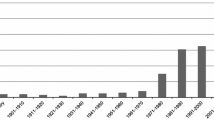Abstract
Within contemporary science, scientific associations have been found to fulfill at least four functions: a communicative function that furthers scientific communication within a discipline or subdiscipline; a profesional function that supports individual careers and represents the collective interests of the members within a discipline; a transfer function that provides a meeting place for scientists and societal users of research results; and a promotion function that advises research institutes and political institutions in science policy decisions. This empirical study investigates German scientific associations and shows how and to what degree they fulfill these functions. The results of the study indicate that the communicative and the transfer functions dominate.
Similar content being viewed by others
References
Bundesbericht Forschung. (1986).Faktenbericht. Bonn: Heger.
Gizycki, R. von. (1976).Prozesse wissenschaftlicher differenzierung. Berlin: Duncker & Humblot.
Gizycki, R. von. (1979). The Associations for the Advancement of Science: An international comparative study.Zeitschrift fuer Soziologie, 8, 28–49.
Lundgreen, P. (1979). Technisch-wissenschaftliche vereine zwischen wissenschaft, staat und industrie, 1860–1914: Umrisse eines forschungsfeldes.Technikgeschichte, 46, 181–191.
Mason, S.F. (1962).A history of the sciences. New York: Collier, Macmillan.
Pfetsch, F. (1974).Zur Entwicklung der Wissenschaftspolitik in Deutschland 1750–1914. Berlin: Duncker & Humblot.
Rilling, R. (1986). The structure of the Gesellschaft Deutscher Chemiker (Society of German Chemists),Social Studies of Science, 16, 235–260.
Schneider, V. (1988).Politiknetzwerke der chemikalienkontrolle. Berlin: De Gruyter.
Vademecum. (1985).Vademecum deutscher Lehr-und Forschungsstaetten. Stuttgart (8. Auflage): Raabe.
Author information
Authors and Affiliations
Additional information
Uwe Schimank is currently a research fellow at the Max-Planck-Institut fur Gesellschaftsforschung in Cologne. He received his doctorate in sociology at the University of Bielefeld. He is presently working on an analysis of the development of extra-university state-financed research institutes in the German research system.
Rights and permissions
About this article
Cite this article
Schimank, U. Scientific associations in the German research system—Results of an empirical study. Knowledge in Society 1, 69–85 (1988). https://doi.org/10.1007/BF02687214
Issue Date:
DOI: https://doi.org/10.1007/BF02687214




